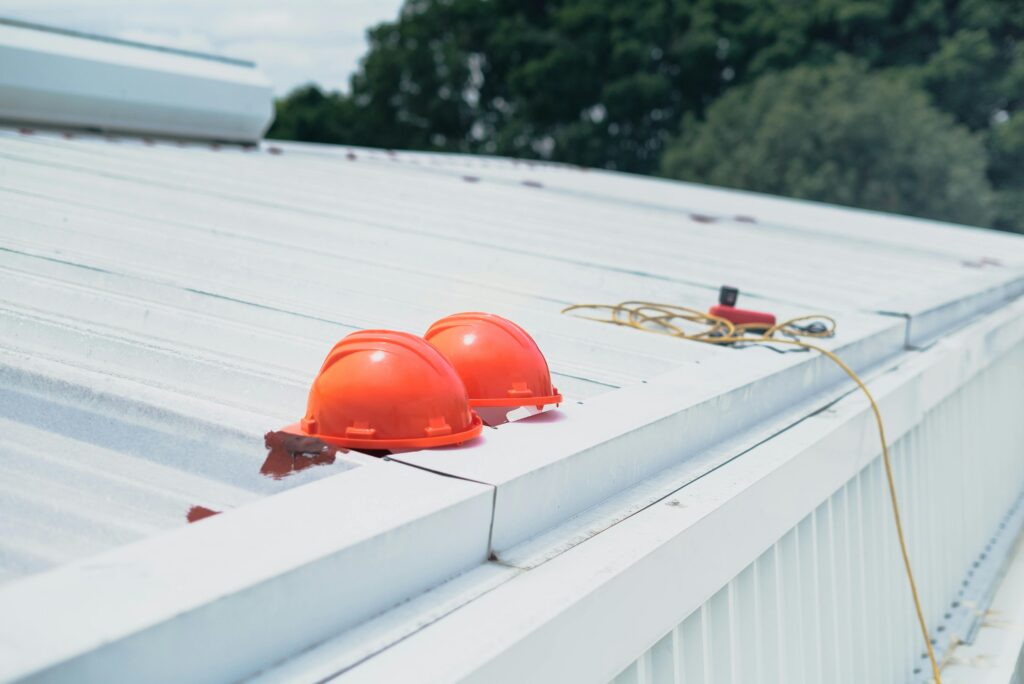
Investing in a commercial roofing system is a significant commitment, one that protects your building, your operations, and your bottom line. But while the roofing material and contractor quality are essential, many property owners overlook another key factor: the roof warranty. A commercial roof warranty serves as a long-term safety net, shielding you from unexpected repair costs and offering assurance that your roofing system will perform as intended.
We’ll explore everything you need to know about commercial roof warranties from types and coverage to common exclusions, local considerations, and smart steps to maintain your protection.
What Is a Commercial Roof Warranty?
A commercial roof warranty is a written agreement that outlines the terms under which your roofing system is protected after installation. This legal document serves to hold the manufacturer, installer, or both accountable for defects, premature failure, or installation errors.
Without a warranty, you could be fully responsible for costly repairs even if the problem stems from a manufacturing flaw or faulty workmanship. Most commercial warranties last 10 to 30 years, depending on the type and scope of coverage. However, not all warranties are created equal. Understanding what’s included, and what is not, can prevent disputes down the line and help you plan maintenance appropriately.
Think of a roof warranty as a roadmap for long-term roof care guiding you through what’s expected, what’s covered, and what actions could void it.
Types of Commercial Roof Warranties
There are three primary types of warranties commonly offered for commercial roofing systems. Each varies in cost, coverage, and who is responsible.
Manufacturer Material Warranty
This type of warranty covers the roofing membrane or materials themselves not the labor or installation. If a material fails due to manufacturing defects, the manufacturer will replace the faulty component.
- Coverage scope: Only the membrane or roofing product
- Limitations: Does not cover damage from poor installation
- Typical duration: 10 to 30 years
- Ideal for: Property owners confident in their roofing contractor’s skill
It’s the most basic form of warranty, but it’s also the most limited. If something goes wrong due to improper installation or weather damage, you will likely have to pay out of pocket.
Workmanship Warranty
This warranty is provided by the roofing contractor and covers any issues arising from poor workmanship or improper installation. A workmanship warranty reflects the contractor’s confidence in their work and often includes routine fixes.
- Coverage scope: Installation errors, poor workmanship
- Typical duration: 1 to 10 years
- May include: Flashing, seams, or attachments
- Ideal for: Ensuring peace of mind with new installations
Workmanship warranties vary widely between contractors, so make sure to get everything in writing. Ask whether they offer prorated or full coverage.
Full System Warranty
A full system warranty offers the most comprehensive coverage, including roofing materials, insulation, adhesives, flashings, and labor.
- Coverage scope: Materials + labor + accessories
- Typical duration: 15 to 30 years
- Responsibility: Generally falls to the manufacturer
- Ideal for: Property owners seeking long-term, total protection
These warranties often require that the installation be completed by a certified contractor and that regular maintenance is performed to remain in good standing.

What Do Most Roof Warranties Cover?
Although every warranty has its own terms, most comprehensive warranties cover:
- Premature membrane failure
- Delamination or cracking of roofing layers
- Fastener pull-out due to material defects
- Seam separation if installed per specification
- Leaks caused by approved accessories or flashing
Many warranties also offer “no dollar limit” (NDL) protection meaning the manufacturer covers all costs to repair or replace the defective roof system, regardless of cost. This is the highest level of warranty protection but usually requires stricter compliance with maintenance and inspection schedules.
Common Exclusions Found in Roof Warranties
Even the most comprehensive warranties include exclusions and failing to understand these can lead to denied claims.
Exclusions often include:
- Storm damage: Wind, hail, or snow often fall under insurance, not the roof warranty
- Ponding water: Unless the warranty specifically addresses this, it may void coverage
- Damage from HVAC units or foot traffic
- Building movement: Structural shifting, settling, or seismic activity
- Neglect or lack of maintenance
- Modifications: Unauthorized repairs or additions to the roof
Before signing a warranty agreement, ask for clarification on exclusions and how they apply in your local area or specific climate.
How to Keep Your Roof Warranty Valid
Many warranty claims are denied simply because the building owner failed to meet their obligations. To keep your warranty active:
1. Schedule Routine Inspections
Most warranties require annual or bi-annual inspections by an approved contractor. These inspections catch minor issues early and provide a maintenance record.
2. Maintain Proper Documentation
Keep all receipts, inspection reports, and service records. If you need to make a claim, this documentation proves your compliance with warranty terms.
3. Use Certified Professionals
Do not allow unlicensed or non-certified contractors to work on your roof. Most warranties require work to be performed by certified roofing professionals.
4. Notify Promptly
If a problem arises, notify the manufacturer or installer right away. Delayed reporting often leads to further damage and a denied claim.
The Importance of Roof Maintenance for Warranty Longevity
Proper maintenance not only extends the lifespan of your roof but also preserves your warranty coverage. Maintenance activities may include:
- Removing debris and standing water
- Checking for punctures or membrane wear
- Sealing loose flashings or seams
- Ensuring drainage systems are clear
- Inspecting HVAC or solar equipment installations
Failing to complete regular maintenance is one of the most common causes of warranty invalidation.

Understanding Local Factors: Commercial Roof Warranties in Michigan
Commercial buildings in Michigan face unique challenges: heavy snow loads, freeze-thaw cycles, ice dams, high humidity in summer, and dramatic temperature shifts. These conditions can place added stress on roofing systems.
When selecting a warranty in Michigan, make sure it includes:
- Snow and ice protection provisions
- Cold-weather performance guarantees
- An installer familiar with local building codes and climate
- Language that addresses ponding water and thermal movement
A warranty designed for warmer regions may not offer the protection needed in the Midwest.
Why “No Dollar Limit” Warranties Offer Peace of Mind
No Dollar Limit (NDL) warranties ensure that the manufacturer covers all costs related to warranted repairs, regardless of the price.
Benefits of NDL Warranties:
- Total financial protection against product failure
- No cap on material or labor costs
- Fewer out-of-pocket expenses for building owners
- Often transferable if the building is sold
Although they may carry a higher upfront cost, NDL warranties provide the strongest safety net over time.
Transferability – Can You Transfer a Commercial Roof Warranty?
Some commercial roof warranties are transferable if the building changes ownership, a valuable selling point for commercial property.
What to check:
- Is the warranty fully transferable or only partially
- Is there a transfer fee or inspection required
- Does the new owner receive the full remaining term
- Are there restrictions based on property type or usage
Transferable warranties increase the value of your property by offering the next owner continued protection.

How to File a Roof Warranty Claim
If a defect occurs, follow these steps to file a successful claim:
- Review your warranty document
- Take photos of the damage
- Contact the manufacturer or contractor immediately
- Submit required paperwork (inspection reports, service logs, etc.)
- Schedule an approved inspection
- Follow all recommendations from the provider
Timely, well-documented claims have the highest chance of approval.
Choosing the Right Warranty for Your Business Needs
No two buildings are alike. When selecting a warranty, consider:
- Your business type and operations
- Whether your roof will house equipment or solar panels
- Expected lifespan of your occupancy
- Maintenance capabilities (in-house vs. outsourced)
- Budget for upfront vs. long-term costs
Work with a reputable roofing contractor who can recommend the ideal combination of product and warranty for your specific goals.
How Silicoat Roofing Helps You Protect Your Investment
At Silicoat Roofing, we believe in protecting your property long after the installation is complete. We work with top-tier manufacturers to provide warranty options that suit your building, budget, and operational needs.
Our services include:
- Detailed warranty consultations
- High-quality installations backed by workmanship guarantees
- Manufacturer-certified crews
- Preventative maintenance programs to keep your warranty active
- NDL warranty options available on most systems
We proudly serve commercial clients across Michigan and understand how to design, install, and protect your roof for decades to come.
Request a Free Commercial Roof Consultation
Don’t wait until there’s a problem to understand your roof warranty. Let Silicoat Roofing help you make informed decisions from the start.
Contact us today to schedule a free consultation, roof inspection, or warranty review. Your roof is your first line of defence we’re here to keep it strong.


 Previous Post
Previous Post Next Post
Next Post